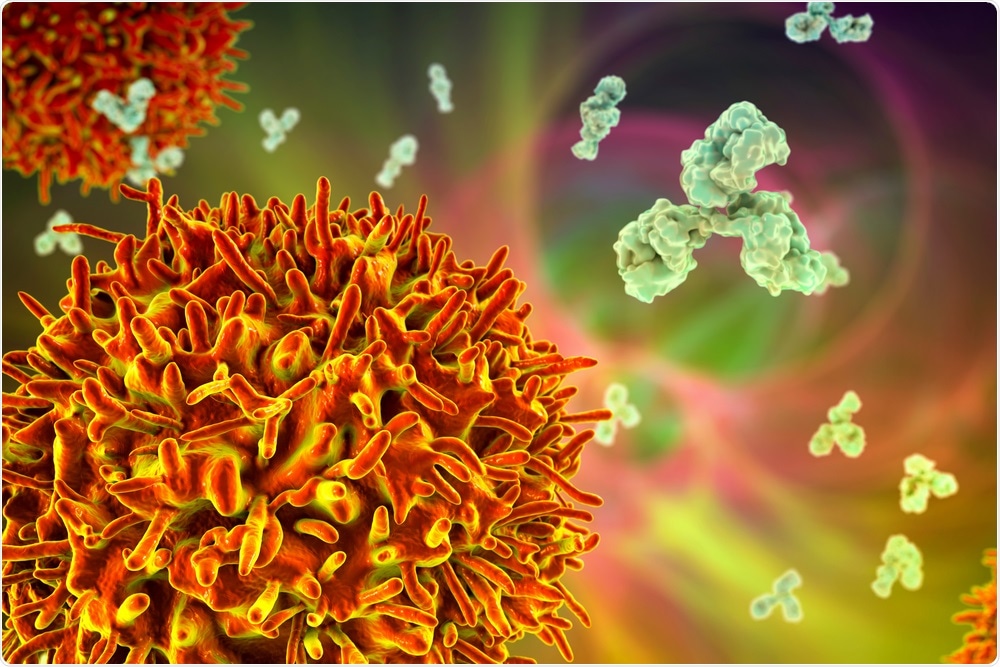B cells are the immune cells responsible for creating antibodies, and most B cells, known as B2 cells, produce antibodies in response to a pathogen or a vaccine, providing defense and immunity against infections.

B Cell and Antibodies. Image Credit: Kateryna Kon/Shutterstock.com
But a small subset of long-lived B cells, known as B1 cells, are quite different from their short-lived cousins, the B2 cells. Instead of producing antibodies in response to invaders, they spontaneously make antibodies that perform vital housekeeping functions, such as removing waste like oxidized LDL cholesterol from the blood.
Like all the cells in the body, B1 and B2 cells have the same DNA, and therefore the same starting set of instructions. It is through epigenetic modifications, which open and close different areas of the genome to the machinery that reads the genetic instructions, that the same genome can be used to create unique instructions for each cell type. Understanding how the different epigenetic landscapes - the changes in instructions - allow for these differences in such similar cells is both an important fundamental question in immunology and can help scientists better understand diseases linked to B cells' dysregulation.
Shiv Pillai, MD, Ph.D., a core member of the Ragon Institute of MGH, MIT, and Harvard, studied the DNA modifications present in both cell types during different stages of development to identify an epigenetic signature that may determine whether a cell becomes a B1 or a B2 cell. This work was published recently in the journal Nature Communications.
Through our analysis, we found the fate of a B cell is determined by epigenetic modifications driven by a protein called DNMT3A. Genetic studies in humans link the genomic regions with these markers to a variety of immune-mediated disorders."
Vinay Mahajan, MD, Ph.D., an instructor in Pathology at the Ragon Institute
The team studied CpG methylation, a type of epigenetic modification that opens up specific areas of DNA and marks regulatory elements that can turn genes on or off. They discovered a set of regulatory elements with unique features in these B1 and B2 cells.
In most cases, CpG methylation is permanent and, once added, is even passed on when the cell replicates. But in B cells, the protein DNMT3A had to continually work to maintain these epigenetic modifications. If DNMT3A was removed from B1 cells, the epigenetic modifications were lost, and chronic lymphomic leukemia (CLL), a cancer caused by the uncontrolled replication of B1 cells, would arise.
"These unique B1 cells are vitally important to our ability to stay healthy," says Pillai. "The antibodies they create help prevent clots and heart attacks. At the same time, understanding what genetic factors regulate them can help us better understand what happens when their regulation goes awry and leads to CLL and other diseases."
Co-authors are Hamid Mattoo, Ph.D., Na Sun, Vinayak Viswanadham, Grace J. Yuen, Ph.D., Hugues Allard-Chamard, MD, Ph.D., Maimuna Ahmad, Samuel J. H. Murphy, Annaiah Cariappa, MD, and Yesim Tuncay.
This work was supported by the National Institutes of Health and Ragon Institute Strategic Funding.
About the Ragon Institute of MGH, MIT, and Harvard
The Ragon Institute of MGH, MIT, and Harvard was established in 2009 with a gift from the Phillip T. and Susan M. Ragon Foundation, creating a collaborative scientific mission among these institutions to harness the immune system to combat and cure human diseases.
With a focus on HIV and infectious diseases, the Ragon Institute draws scientists, clinicians, and engineers from diverse backgrounds and areas of expertise to study and understand the immune system with the goal of benefiting patients. For more information, visit http://www.ragoninstitute.org
About the Massachusetts General Hospital
Massachusetts General Hospital, founded in 1811, is the original and largest teaching hospital of Harvard Medical School. The Mass General Research Institute conducts the largest hospital-based research program in the nation, with annual research operations of more than $1 billion and comprises more than 9,500 researchers working across more than 30 institutes, centers, and departments.
In August 2020, Mass General was named #6 in the U.S. News & World Report list of "America's Best Hospitals."